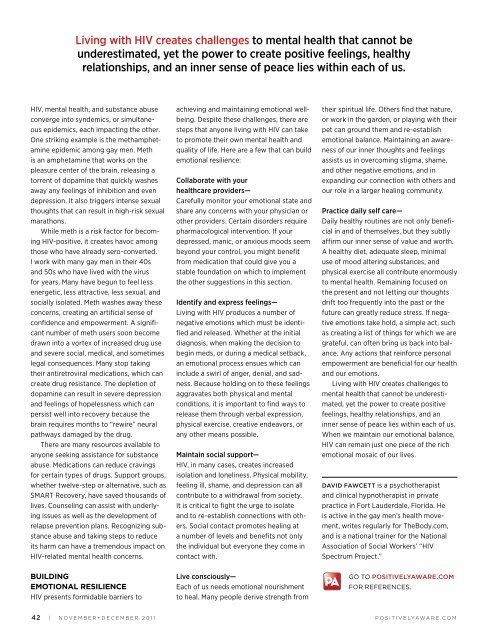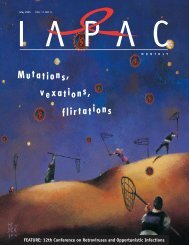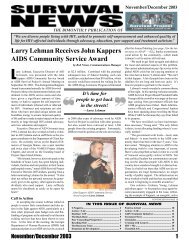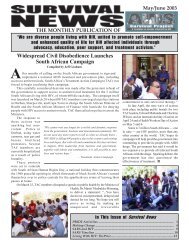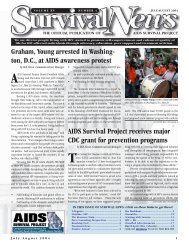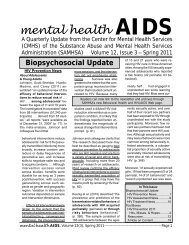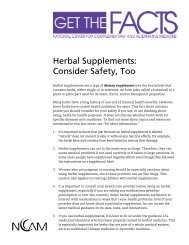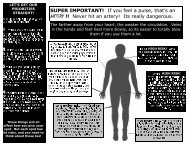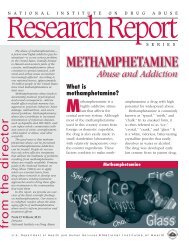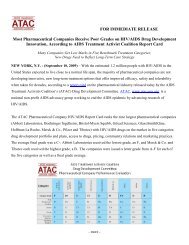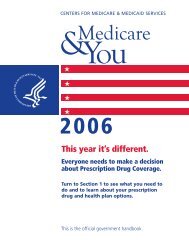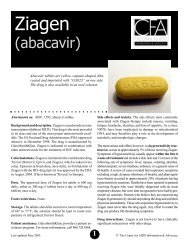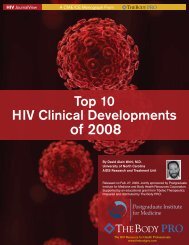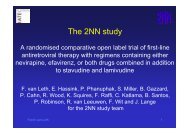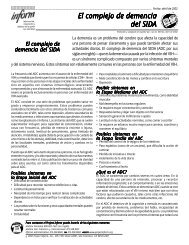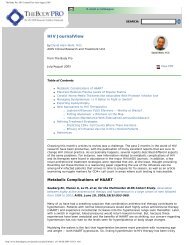Briefly - CD8 T cells - The Body
Briefly - CD8 T cells - The Body
Briefly - CD8 T cells - The Body
You also want an ePaper? Increase the reach of your titles
YUMPU automatically turns print PDFs into web optimized ePapers that Google loves.
living with HIV creates challenges to mental health that cannot be<br />
underestimated, yet the power to create positive feelings, healthy<br />
relationships, and an inner sense of peace lies within each of us.<br />
HIV, mental health, and substance abuse<br />
converge into syndemics, or simultaneous<br />
epidemics, each impacting the other.<br />
One striking example is the methamphetamine<br />
epidemic among gay men. Meth<br />
is an amphetamine that works on the<br />
pleasure center of the brain, releasing a<br />
torrent of dopamine that quickly washes<br />
away any feelings of inhibition and even<br />
depression. It also triggers intense sexual<br />
thoughts that can result in high-risk sexual<br />
marathons.<br />
While meth is a risk factor for becoming<br />
HIV-positive, it creates havoc among<br />
those who have already sero-converted.<br />
I work with many gay men in their 40s<br />
and 50s who have lived with the virus<br />
for years. Many have begun to feel less<br />
energetic, less attractive, less sexual, and<br />
socially isolated. Meth washes away these<br />
concerns, creating an artificial sense of<br />
confidence and empowerment. A significant<br />
number of meth users soon become<br />
drawn into a vortex of increased drug use<br />
and severe social, medical, and sometimes<br />
legal consequences. Many stop taking<br />
their antiretroviral medications, which can<br />
create drug resistance. <strong>The</strong> depletion of<br />
dopamine can result in severe depression<br />
and feelings of hopelessness which can<br />
persist well into recovery because the<br />
brain requires months to “rewire” neural<br />
pathways damaged by the drug.<br />
<strong>The</strong>re are many resources available to<br />
anyone seeking assistance for substance<br />
abuse. Medications can reduce cravings<br />
for certain types of drugs. Support groups,<br />
whether twelve-step or alternative, such as<br />
SMART Recovery, have saved thousands of<br />
lives. Counseling can assist with underlying<br />
issues as well as the development of<br />
relapse prevention plans. Recognizing substance<br />
abuse and taking steps to reduce<br />
its harm can have a tremendous impact on<br />
HIV-related mental health concerns.<br />
builDing<br />
emotional Resilience<br />
HIV presents formidable barriers to<br />
achieving and maintaining emotional wellbeing.<br />
Despite these challenges, there are<br />
steps that anyone living with HIV can take<br />
to promote their own mental health and<br />
quality of life. Here are a few that can build<br />
emotional resilience:<br />
Collaborate with your<br />
healthcare providers—<br />
Carefully monitor your emotional state and<br />
share any concerns with your physician or<br />
other providers. Certain disorders require<br />
pharmacological intervention. If your<br />
depressed, manic, or anxious moods seem<br />
beyond your control, you might benefit<br />
from medication that could give you a<br />
stable foundation on which to implement<br />
the other suggestions in this section.<br />
Identify and express feelings—<br />
Living with HIV produces a number of<br />
negative emotions which must be identified<br />
and released. Whether at the initial<br />
diagnosis, when making the decision to<br />
begin meds, or during a medical setback,<br />
an emotional process ensues which can<br />
include a swirl of anger, denial, and sadness.<br />
Because holding on to these feelings<br />
aggravates both physical and mental<br />
conditions, it is important to find ways to<br />
release them through verbal expression,<br />
physical exercise, creative endeavors, or<br />
any other means possible.<br />
Maintain social support—<br />
HIV, in many cases, creates increased<br />
isolation and loneliness. Physical mobility,<br />
feeling ill, shame, and depression can all<br />
contribute to a withdrawal from society.<br />
It is critical to fight the urge to isolate<br />
and to re-establish connections with others.<br />
Social contact promotes healing at<br />
a number of levels and benefits not only<br />
the individual but everyone they come in<br />
contact with.<br />
live consciously—<br />
Each of us needs emotional nourishment<br />
to heal. Many people derive strength from<br />
their spiritual life. Others find that nature,<br />
or work in the garden, or playing with their<br />
pet can ground them and re-establish<br />
emotional balance. Maintaining an awareness<br />
of our inner thoughts and feelings<br />
assists us in overcoming stigma, shame,<br />
and other negative emotions, and in<br />
expanding our connection with others and<br />
our role in a larger healing community.<br />
Practice daily self care—<br />
Daily healthy routines are not only beneficial<br />
in and of themselves, but they subtly<br />
affirm our inner sense of value and worth.<br />
A healthy diet, adequate sleep, minimal<br />
use of mood altering substances, and<br />
physical exercise all contribute enormously<br />
to mental health. Remaining focused on<br />
the present and not letting our thoughts<br />
drift too frequently into the past or the<br />
future can greatly reduce stress. If negative<br />
emotions take hold, a simple act, such<br />
as creating a list of things for which we are<br />
grateful, can often bring us back into balance.<br />
Any actions that reinforce personal<br />
empowerment are beneficial for our health<br />
and our emotions.<br />
Living with HIV creates challenges to<br />
mental health that cannot be underestimated,<br />
yet the power to create positive<br />
feelings, healthy relationships, and an<br />
inner sense of peace lies within each of us.<br />
When we maintain our emotional balance,<br />
HIV can remain just one piece of the rich<br />
emotional mosaic of our lives.<br />
DaVID fawCeTT is a psychotherapist<br />
and clinical hypnotherapist in private<br />
practice in Fort Lauderdale, Florida. He<br />
is active in the gay men’s health movement,<br />
writes regularly for <strong>The</strong><strong>Body</strong>.com,<br />
and is a national trainer for the National<br />
Association of Social Workers’ “HIV<br />
Spectrum Project.”<br />
gO tO PosITIVelyaware.Com<br />
fOR REfERENcES.<br />
42 | N O V E M B E R + D E C E M B E R 2 0 1 1 P O s i t i V E lyAwA R E . C O M


